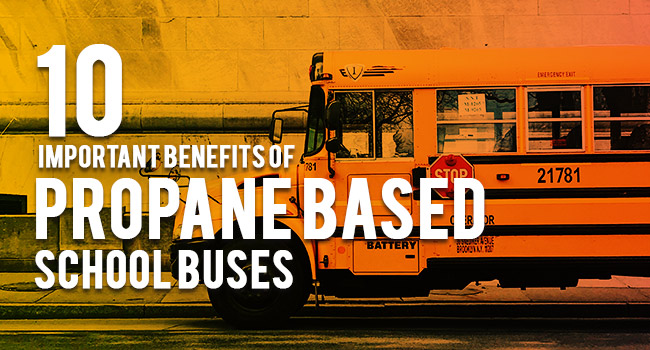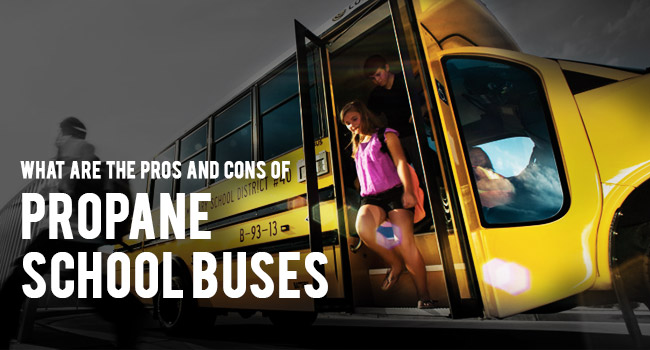Propane is more widely available and is cheaper than both gasoline and diesel which makes it a preferred fuel for running school buses. Generically known as liquefied petroleum gas, propane is available even in rural areas.
The number of school districts that are using propane for their school bus fleets is on the rise. Propane-based school bus sale has increased by around 500% since the year 1912. As of last year, there are about 13000 propane-based school buses that ferry close to 800000 students to and from schools every day.
This naturally leads to the inference that school buses that use propane are seeing more advantages as compared to others. This article attempts to list 10 of the most obvious and important advantages as to why school bus fleets want to power their buses with this gas.
Here follows the 10 important advantages of propane based school buses which you must know.
1: Financial gains
The primary reason why many schools choose propane is for financial gains. The price of propane is low as compared to traditional gasoline or diesel and also reduces the operating costs. The school buses were able to save to the extent of $3000 per bus if it starts running on propane. The range of savings, however, depends on the price of the fuel.
Right away propane is costing just half as much as diesel from the pump station. In a majority of cases, the school sins a contract with the propane retailer for the fuel consumption of the entire fleet of buses and this makes the cost of propane even lower.
2: Lowered maintenance costs
With propane based school buses, it is possible to save maintenance cost This can be possible in several areas, one being less-frequent changes of the engine oil.
An oil change for propane takes up only 7 quarts of oil. However, for a diesel engine, the oil change requires about 17-36 quarts of oil. The next reason is the installation of less complicated emission control systems which do not use the diesel exhaust fluid. The fuel burns in a clean manner and there is no requirement for add-on filters usually used by diesel engine systems.
3: Propane is a proven fuel alternative
Propane has been used in vehicles ever since the 1970s which makes the technology almost five decades old and proven. Many school districts started using propane from as early as the 1980s.
4: Quick returns on the investments are possible with propane
School districts that had purchased propane-based school bus fleets got back their initial investment in just about an 18- to 24-month period. This was because of reduced fuel expenditure and lowered maintenance costs.
Typically, the cost of propane has a value that is midway between the price of natural gas and oil. Schools also do well by negotiating a fixed propane price for the entire year with the local retailer.

5: Propane is a non-toxic fuel and is non-spillable too
Propane has lots of good characteristics:
• It does not contaminate the soil, air or water
• It is not made up of harmful chemicals like diesel and gasoline
• Propane is usually used in a closed-loop system as a result of which it does not spill
• There are no major clean-up concerns for this fuel
6: The refuelling infrastructure is spread out and big enough
Many of the districts have multiple points from where the school bus fleet can refuel. Each fleet can have their own refuelling strategy. The individual buses from a fleet can be part of a refuelling network.
These networks can be used by those bus fleets that do not have a refuelling facility and infrastructure in their premises. Most of the refuelling stations function 24/7 for the convenience of the bus fleets.
7: The propane refuelling infrastructure is easy to create
For bus fleets of big sizes, it is worthwhile to consider installation of a propane refuelling facility if there is sufficient space in their premises. The infrastructure is affordable and is cheaper than installing stations for dispensing petrol or diesel.
If the refuelling station is outside the premises, a centralized location would be the best as it serves to reduce downtime of the buses. It is also a matter of convenience. Such refuelling centres can be up-scaled when the sizes of the fleets increase.
8: Propane engines operate in a cleaner fashion
As propane engines operate in a cleaner manner than diesel engines. This means that school running propane-based buses set do not have to buy an extra set of about 20 ancillary parts that are required to clean the unwanted emissions of diesel engines.
Without these parts, diesel engines would fail to meet environmental protection standards as far as emissions are concerned.
Propane-based buses emit fewer oxides of nitrogen and almost no particulate matter as compared to diesel.
9: Propane buses have no cold-start problems
Propane buses do not have cold-start issues with the result that the school saves a lot of time as well as money.
10: Drivers love propane-based buses
Drivers love propane based buses for the fact that they operate in a much quieter fashion, they accelerate quickly and are easier to handle, unlike diesel buses.
They do not have the exhaust fumes of diesel engines either. They are quick to start even in the dead of winter. Propane buses do not have to ’idle’ before it starts to move. At the end of it all, they are easier to clean and maintain.
Conclusion
A major cost for most schools is the transportation system. The rising fuel costs coupled with the fact that diesel engine mechanics are rare breed these days, most of the schools are settling for buses that use alternative fuels like propane instead of conventional fuels like diesel and gasoline.

